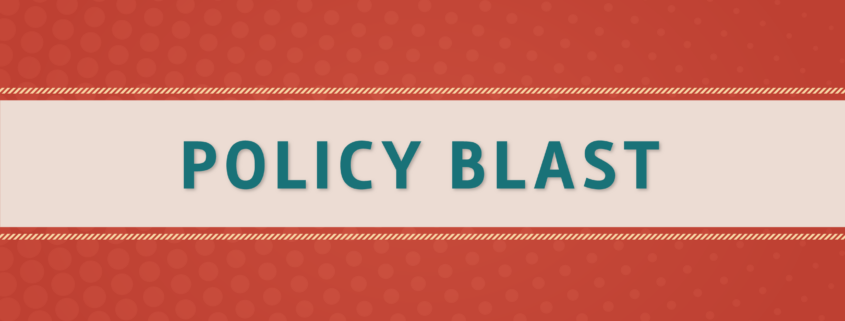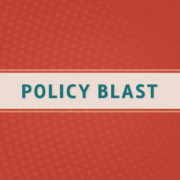Omnibus Bill Released with VAWA and Strides for Urban Indian Health
The bill includes $73.4 million for urban Indian health and $6.6 billion for IHS
On March 9, 2022, the House Appropriations Committee released a draft of the Consolidated Appropriations Act, 2022 (H.R. 2471) for Fiscal Year (FY) 2022 (also known as the “Omnibus”) consisting of $1.5 trillion in discretionary spending and $15.6 billion to manage the COVID-19 pandemic. This bill comes after Congress passed three Continuing Resolutions maintaining the FY 2021 budget, with the most recent CR set to expire on March 11, 2022. The 2741-page omnibus bill authorizes $6.6 billion for the Indian Health Service (IHS) for FY 2022, a 6.3% increase above the FY 2021 enacted level; $73.4 million for urban Indian health for FY 2022, a 17.13% increase above the FY 2021 enacted level and the highest increase in the past 10 years; 2022 Violence Against Women Act (VAWA) Reauthorization with Tribal and urban Indian provisions; and COVID-19 supplementals to manage the pandemic domestically and abroad.
The Tribal Budget Formulation Workgroup (TBFWG) requested $12.8 billion for the Indian Health Service and the House included $8.1 billion in its passed legislation, however, the amount enacted would be the highest increase of any account for the Department of Interior and Related Agencies, which demonstrates a strong bipartisan commitment from Congress to improving health outcomes for American Indians and Alaska Natives. Unfortunately, though, the final amount still falls well short of fully funding the Indian Health Service to properly provide health care services for all American Indians and Alaska Natives in the United States to meet the trust responsibility. Additionally, the bill does not include Advance Appropriations despite robust advocacy from Tribes and Urban Indian Organizations.
Current Status and Next Steps
Funding for the federal government expires on March 11. Congress will likely approve the current continuing resolution through March 15. It is expected that the Omnibus will be approved by Congress and signed into law by the President. As of 2:45 p.m. ET today, the COVID-19 supplemental funding has been removed and Speaker Pelosi says the House will move forward to vote on the Omnibus without the COVID funding. The National Council of Urban Indian Health (NCUIH) will continue to monitor developments and provide more in-depth analysis as legislation continues to move forward.
Overview of IHS and Urban Indian Health Requests
| Line Item | FY21 Enacted | FY22 TBFWG Request | FY22 President’s Budget |
FY22 House Passed |
FY22 Senate Proposed |
FY22 Draft Omnibus |
| Urban Indian Health |
$62,684,000 | $200,548,000 | $100,000,000 | $200,500,000 | $92,684,000 | $73,424,000 |
| Indian Health Service | $6,236,279,000 | $12,759,004,000 | $8,471,279,000 | $8,100,000,000 | $7,616,250,000 | $6,630,986,000 |
| Advance Appropriations | – | – | – | – | $6,586,250,000 (FY23) | – |
| Missing and Murdered Indigenous Women | – | – | – | – | $24,900,000 | – |
Summary
In summary, the package includes the following NCUIH priorities for Urban Indian health:
- $73.4 million for urban Indian health for FY 2022
- Inclusion of UIOs in the 2022 VAWA reauthorization
- $30 million annually from FY23-FY27 for grants for Creating Hope Through Outreach, Options, Services, and Education for Children and Youth (CHOOSE Children & Youth) grants to enhance the safety of youth and children who are victims of, or exposed to, domestic violence, dating violence, sexual assault, stalking, or sex trafficking and prevent future violence.
- UIOs added as eligible entities.
- $10 million annually for a new 3-year program (FY23-FY27) to award grants for the clinical training of sexual assault forensic examiners to administer medical forensic examinations and treatments to survivors of sexual assault. Of the $10 million, there is a set aside of 15 percent for purposes of making grants to entities that are affiliated with Indian Tribes or Tribal organizations or Urban Indian organizations.
- UIOs included as eligible entities.
- $5 million for a new 5-year demonstration grants (FY23-FY27) established for comprehensive clinical training of health care providers to provide generalist forensic services and trauma-informed care to survivors of interpersonal violence of all ages. Of the $5 million, there is a set-aside of 10 percent for purposes of making grants to support training and curricula that addresses the unique needs of Indian Tribes, Tribal organizations, Urban Indian organizations, and Native Hawaiian organizations.
- UIOs included as eligible entities.
- Title VIII “Safety for Indian Women” includes the following purposes:
- to empower Tribal governments and Native American communities, including urban Indian communities and Native Hawaiian communities, with the resources and information necessary to effectively respond to cases of domestic violence, dating violence, stalking, sex trafficking, sexual violence, and missing and murdered Native Americans; and
- to increase the collection of data related to missing and murdered Native Americans and the sharing of information among Federal, State, Tribal, and local officials responsible for responding to and investigating crimes impacting Indian Tribes and Native American communities, including urban Indian communities and Native Hawaiian communities, especially crimes relating to cases of missing and murdered Native Americans.
In summary, the bill provides the following for IHS, tribal organizations, and Urban Indian Organizations (UIOs):
- $6.6 billion for the Indian Health Service for fiscal year 2022
- $4.7 billion for the IHS health services account
- Fully funds Contract Support Costs and Payments for Tribal Leases
- $940 million for health facilities construction
- $12 million from Substance Abuse and Mental Health Services Administration (SAMHSA) to Indian Tribes, Tribal Organizations, or consortia for Medication-Assisted Treatment for Prescription Drug and Opioid Addiction
- Increase to SAMHSA State Opioid Response (SOR) Grants for tribes and tribal organizations
- UIO are not included
- $22.5 million for the Good Health and Wellness in Indian Country program
- $15.6 million to make payments under the National Health Service Corps loan repayment program
Background and Advocacy
The National Council of Urban Indian Health (NCUIH) has long advocated for larger investments in AI/AN health care and has called on Congress to strengthen their commitment to Indian Country with increased funding in the FY 2022 appropriations:
- NCUIH Policy Alert – House Interior Appropriations Bill Advances with Historic Inclusion of $200.5 Million for Urban Indian Health
- NCUIH Policy Alert – Senate Releases FY22 Funding Bills with Historic Increase for Urban Indian Health, Indian Health Service, Advance Appropriations, MMIW and UIO Facility Fix
Most recently, NCUIH joined the National Indian Health Board (NIHB) and 70 organizations in a letter to several Members of Congress and Congressional Committees urging for Advance Appropriations and no less than the House-passed level of $8.114 billion for IHS in the final Appropriations bill for FY 2022:
- House Committee on Appropriations and Appropriations Subcommittee on Interior
- House Committee on Natural Resources and Subcommittee for the Indigenous Peoples of the United States
- House Native American Caucus
- Speaker of the House and House Minority Leader
- Senate Committee on Appropriations and Appropriations Subcommittee on Interior
- Senate Committee on Indian Affairs
- Senate Majority Leader and Senate Minority Leader
VAWA
NCUIH has been tirelessly advocating for an expansion of resources for all AI/ANs, including those who reside off-reservation, in the VAWA reauthorization. Since the passing of the House bill on VAWA (H.R. 1620) early last year which excluded support for off-reservation AI/ANs, NCUIH successfully advocated for urban Indian communities to be added in the Senate draft bill released on December 8, 2021. NCUIH, UIOs, and stakeholders supporting Indian health provided written comments to Senate Committee on Indian Affairs (SCIA) leadership to retain the provisions to assist all AI/ANs in the final VAWA reauthorization bill.









Leave a Reply
Want to join the discussion?Feel free to contribute!